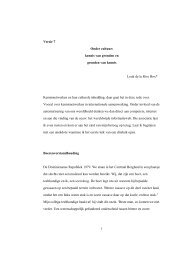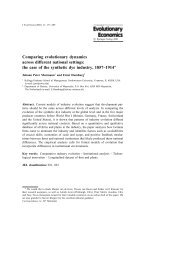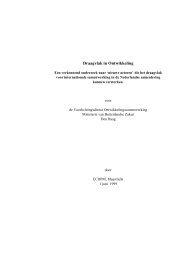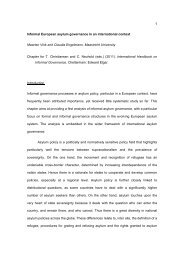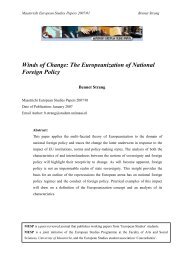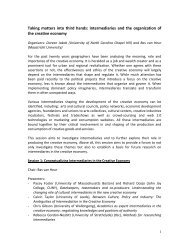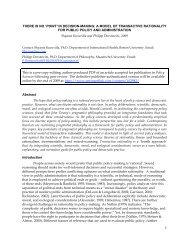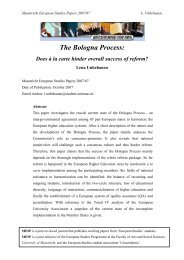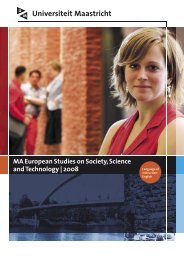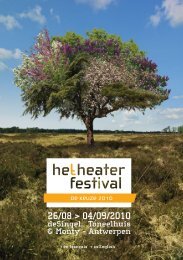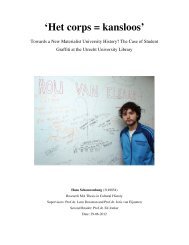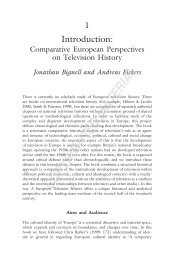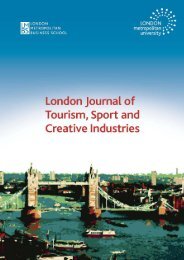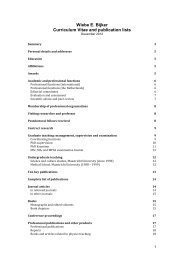Crossing the divide: - Maastricht University
Crossing the divide: - Maastricht University
Crossing the divide: - Maastricht University
You also want an ePaper? Increase the reach of your titles
YUMPU automatically turns print PDFs into web optimized ePapers that Google loves.
Towards a new approach: is local knowledge <strong>the</strong> answer?<br />
The subsequent question is <strong>the</strong>refore: is <strong>the</strong> type of knowledge that modern science<br />
produces to blame for this? Could it be that ano<strong>the</strong>r type of knowledge would be<br />
more relevant to <strong>the</strong> needs of <strong>the</strong> poor in poor countries and produce less<br />
inequalities as just signalled? This is a question that has increasingly occupied<br />
social scientists, especially those interested in <strong>the</strong> questions raised by Claude<br />
Alvares and o<strong>the</strong>rs.<br />
The knowledge network approach advocated in <strong>the</strong> Human Development Report<br />
assumes an appreciation for joint learning. Joint learning means: common<br />
authorship of <strong>the</strong> insights obtained. Some examples may clarify this point.<br />
• When Dutch soil scientists in Vietnam discovered a certain type of soil<br />
deterioration, <strong>the</strong>y described it and were <strong>the</strong> first to publish <strong>the</strong> findings.<br />
When I asked how <strong>the</strong>y had found out about <strong>the</strong> phenomenon, it became<br />
clear <strong>the</strong>y had followed a farmer’s clue about <strong>the</strong> process. They had<br />
described <strong>the</strong> process, not discovered it. Was <strong>the</strong> farmer’s name included<br />
among <strong>the</strong> authors of <strong>the</strong> publication?<br />
• When a Dominican plant pathologist discovered <strong>the</strong> incidence of a blue<br />
mould on tobacco in <strong>the</strong> late 1970s, peers and <strong>the</strong> public widely (and rightly)<br />
hailed her. When I asked how she had found out about it, she acknowledged<br />
<strong>the</strong> clues she had received from <strong>the</strong> growers. She had ‘certified’ <strong>the</strong> disease,<br />
but had not discovered it.<br />
These examples are indicative of a more general phenomenon: how to acknowledge<br />
<strong>the</strong> contribution of non-professional scientists to such knowledge networks? In<br />
traditional science <strong>the</strong> case is simple: <strong>the</strong> scientist or group of scientists who first<br />
publish can claim primacy. The technologist who first patents an invention can claim<br />
<strong>the</strong> proceeds. In <strong>the</strong> emerging mode of knowledge production this becomes much<br />
more complicated. Especially for <strong>the</strong> type of knowledge that is <strong>the</strong> subject of<br />
international cooperation arrangements.<br />
This problem needs to be tackled for both pragmatic and ethical reasons. If science<br />
is not a world to itself any more and involves non-professionals, <strong>the</strong>n <strong>the</strong>se nonprofessionals<br />
have a right to profit from <strong>the</strong> prestige or <strong>the</strong> profits. This argument<br />
applies to <strong>the</strong> soil scientist in Vietnam, but also to <strong>the</strong> pharmaceutical company that<br />
has engaged in ‘gene hunting’ (Juma 1989) and has appropriated a particular<br />
substance through <strong>the</strong> involvement of tropical farmers.<br />
It is striking to note how little formal science has acknowledged <strong>the</strong>se types of<br />
insights, which are often gained through informal knowledge networks. The<br />
phenomenon has been well known throughout <strong>the</strong> history of science; <strong>the</strong> distinction<br />
between ‘scientist’ and ‘dilettante’ being a fairly recent one. The word ‘scientist’ was<br />
first used in English as an analogy to <strong>the</strong> word ‘artist’ in 1834; dilettante is somewhat<br />
younger and stems from 1748 (Webster’s Dictionary).<br />
Learned societies would have both categories among <strong>the</strong>ir membership, and<br />
stimulate <strong>the</strong>ir scientific curiosity. Anne Secord (1994: 408) studied <strong>the</strong> contributions<br />
of so-called artisan-entomologists, zoologists and botanists in early 19th-century



